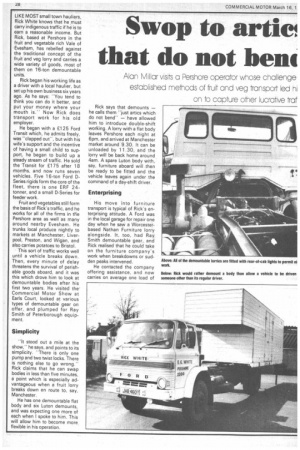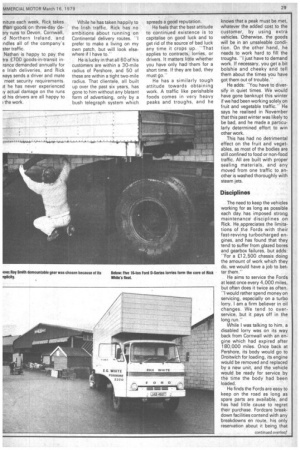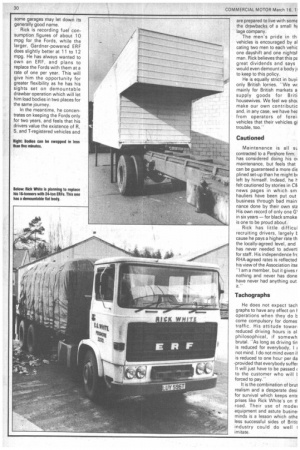Swop to artie that do not bent
Page 30

Page 31

Page 32

If you've noticed an error in this article please click here to report it so we can fix it.
Alan Millar visits a Pershore operator whose challenge established me nods of fruit and veg transport led hi
on to cao-ure o er lucrative traf LIKE MOST small town hauliers, Rick White knows that he ,must carry indigenous traffic if he is to earn a reasonable income. But Rick, based at Pershore in the fruit and vegetable rich Vale of Evesham, has rebelled against the traditional concept of the fruit and veg lorry and carries a wide variety of goods, most of them on 1-6-ton demountable units.
Rick began his working life as a driver with a local haulier, but set up his own business six years ago. As he says: -You tend to think you can do it better, and put your money where your mouth is." Now Rick does transport work for his old employer: He began with a £125 Ford Transit which, he admits freely, was -clapped out", but with his wife's support and the incentive of having a small child to support, he began to build up a steady stream of traffic. He sold the Transit for £175 after 18 months, and now runs seven vehicles. Five 16-ton Ford DSeries rigids form the core of the fleet, there is one ERF 24tonner, and a small D-Series for feeder work.
Fruit and vegetables still form the basis of Rick's traffic, and he works for all of the firms in the Pershore area as well as many around nearby Evesham. He trunks local produce nightly to markets at Manchester, Liverpool, Preston, and Wigan, and also carries potatoes to Bristol.
This sort of traffic works well until a vehicle breaks down. Then, every minute of delay threatens the survival of perishable goods aboard, and it was this which drove him to look at demountable bodies after his first two years. He visited the Commercial Motor Show at Earls Court, looked at various types of demountable gear on offer, and plumped for Ray Smith of Peterborough equipment.
Simplicity "It stood out a mile at the show,he says, and points to its simplicity. "There is only one pump and two twist locks. There is nothing else to go wrong." Rick claims that he can swap bodies in less than five minutes, a point which is especially advantageous when a fruit lorry breaks down en route to, say, Manchester.
He has one demountable flat body and six Luton demounts, and was expecting one more of each when I spoke to him. This will allow him to become more flexible in his operation.
Rick says that demounts — he calls them ''just artics which do not bend— have allowed him to introduce double-shift working. A lorry with a flat body leaves Pershore each night at 6pm, and arrived at Manchester market around 9.30. it can be unloaded by 11.30, and the lorry will be back home around 4am. A spare Luton body with, say, furniture aboard will then be ready to be fitted and the vehicle leaves again under the command of a day-shift driver.
Enterprising
His move into furniture transport is typical of Rick's enterprising attitude, A Ford was in the local garage for repair one day when he saw a Worcesterbased Nathan Furniture lorry alongside. It, too, had Ray Smith demountable gear, and Rick realised that he could take on the furniture company's work when breakdowns or sudden peaks intervened.
He contacted the company
offering assistance, and now Below: Rick would rather demount a body than allow a vehicle to be driven carries on average one load of someone other than its regular driver.
niture each week. Rick takes than goods on three-day deary runs to Devon, Cornwall, id Northern Ireland, and Indies all of the company's ster traffic.
Nathan is happy to pay the tra £700 goods-in-transit inrance demanded annually for e Irish deliveries, and Rick Nays sends a driver and mate meet security requirements. It he has never experienced ly actual damage on the runs id his drivers are all happy to the work. While he has taken happily to the Irish traffic, Rick has no ambitions about running on Continental delivery routes. "I prefer to make a living on my own patch, but will look elsewhere if I have to.'" He is lucky in that all 60 of his customers are within a 30-mile radius of Pershore, and 50 of these are within a tight two-mile radius. That clientele, all built up over the past six years, has gone to him without any blatant form of advertising, only by a bush telegraph system which spreads a good reputation.
He feels that the best attitude to continued existence is to capitalise on good luck and to get rid of the source of bad luck any time it crops up. "That applies to contracts, lorries, or drivers. It matters little whether you have only had them for a short time. If they are bad, they must go."
He has a similarly tough attitude towards obtaining work. A traffic like perishable foods comes in very heavy peaks and troughs, and he knows that a peak must be met, whatever the added cost to the customer, by using extra vehicles. Otherwise, the goods will be in an unsaleable condition. On the other hand, he needs to work hard to fill the troughs. "I just have to demand work. If necessary, you get a bit bolshie and cheeky and tell them about the times you have got them out of trouble."
He adds: "You have to diversify in quiet times. We would have gone bankrupt this winter if we had been working solely on fruit and vegetable traffic." He says he realised in November that this past winter was likely to be bad, and he made a particularly determined effort to win other work.
This has had no detrimental effect on the fruit and vegetables, as most of the bodies are still confined to food or non-food traffic. All are built with proper sealing materials, and any moved from one traffic to another is washed thoroughly with steam jets.
Disciplines
The need to keep the vehicles working for as long as possible each day has imposed strong maintenance disciplines on Rick. He appreciates the limitations of the Fords with their fast-revving turbocharged engines, and has found that they tend to suffer from glazed bores and gearbox failures, but adds: "For a £12,500 chassis doing the amount of work which they do, we would have a job to better them.
He aims to service the Fords at least once every 4,000 miles, but often does it twice as often.
I would rather spend money on servicing, especially on a turbo lorry. I am a firm believer in oil changes. We tend to overservice, but it pays off in the long run."
While I was talking to him, a disabled lorry was on its way back from Cornwall with an en gine which had expired after 180,000 miles. Once back at Pershore, its body would go to Droitwich for loading, its engine would be removed and replaced by a new unit, and the vehicle would be ready for service by the time the body had been loaded.
He finds the Fords are easy to keep on the road as long as spare parts are available, and has had little cause to regret their purchase_ Fordcare breakdown facilities contend with any breakdowns en route, his only reservation about it being that some garages may let down its generally good name.
Rick is recording fuel consumption figures of about 10 mpg for the Fords, while the larger, Gardner-powered ER F does slightly better at 11 to 12 mpg. He has always wanted to own an ERF, and plans to replace the Fords with them at a rate of one per year. This will give him the opportunity for greater flexibility as he has his sights set on demountable drawbar operation which will let him load bodies in two places for the same journey.
In the meantime, he concentrates on keeping the Fords only for two years, and feels that his drivers value the existence of R, S. and T-registered vehicles and are prepared to live with some the drawbacks of a small 1-u lage company.
The men's pride in th vehicles is encouraged by al cating two men to each vehic one dayshift and one nightsf man. Rick believes that this pE great dividends and says would even demount a body ji to keep to this policy.
He is equally strict in buyi only British lorries. -We wc mainly for British markets a supply goods for Briti housewives. We feel we shoi make our own contributic and, in any case, we have he from operators of forei, vehicles that their vehicles gi trouble, too.'"
Cautioned
Maintenance is all st, contracted to a Pershore firm. has considered doing his co maintenance, but feels that can be guaranteed a more dis plined set-up than he might bi left by himself. Indeed, he 1felt cautioned by stories in CA news pages in which sm hauliers have been put out business through bad main nance done by their own stE His own record of only one G' in six years — for black smoke is one to be proud about.
Rick has little difficul recruiting drivers, largely t cause he pays a higher rate th the locally-agreed level, and has never needed to advert for staff. His independence frc RHA-agreed rates is reflected his view of the Association itse -I am a member, but it gives r nothing and never has done have never had anything out it.'"
Tachographs
He does not expect tach graphs to have any effect on 1 operations when they do h come compulsory for domes traffic. His attitude towar reduced driving hours is al philosophical, if somewh brutal. As long as driving tin is reduced for everybody, I 4 not mind. I do not mind even i1 is reduced to one hour per da 'provided that everybody suffel It will just have to be passed to the customer who will 1 forced to pay."
It is the combination of brui realism and a desperate desi for survival which keeps ente prises like Rick White's on t1 road. Their use of model equipment and astute busine: minds is a lesson which othe less successful sides of Britis industry could do well 1 imitate.
























































































































































